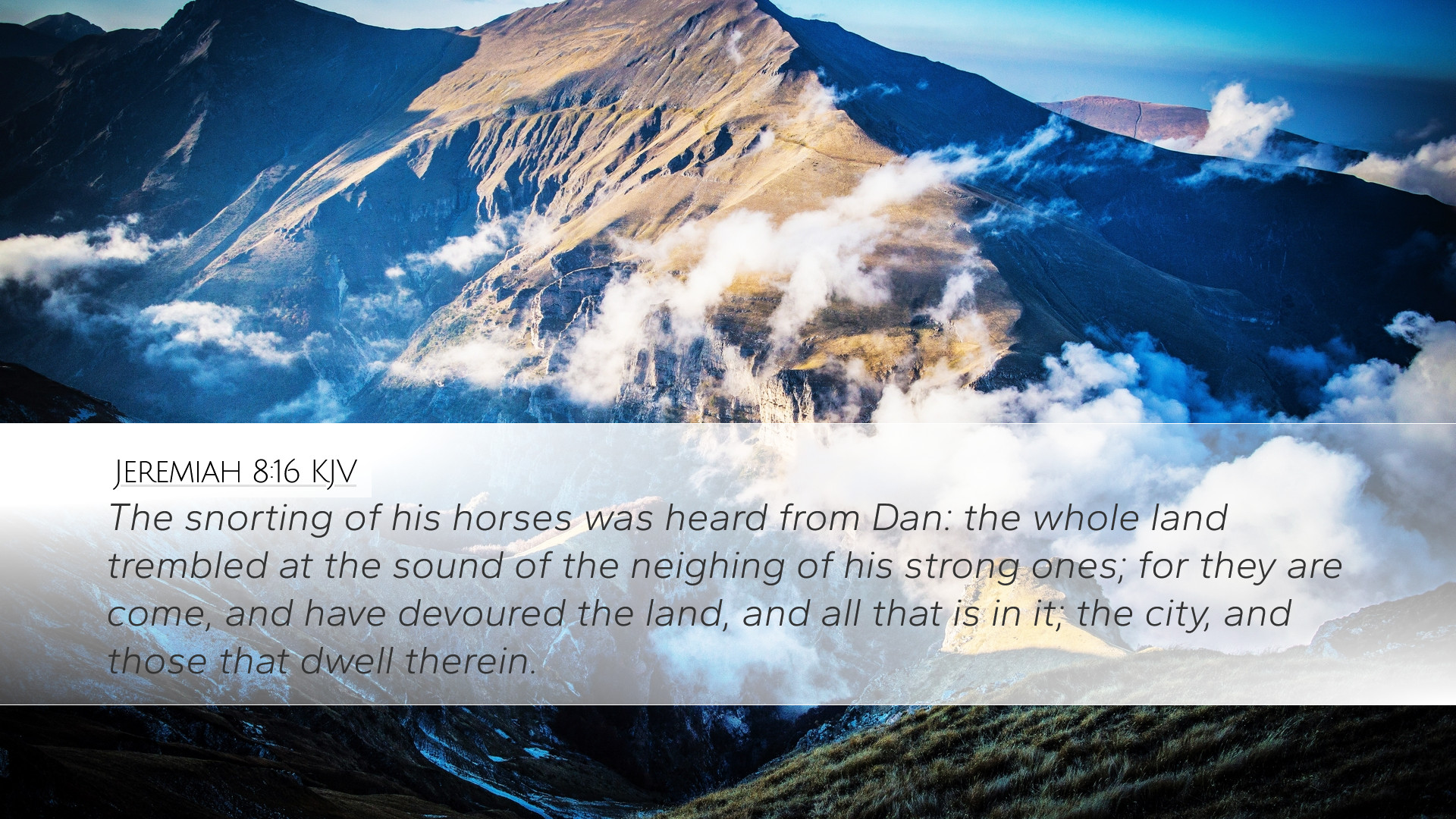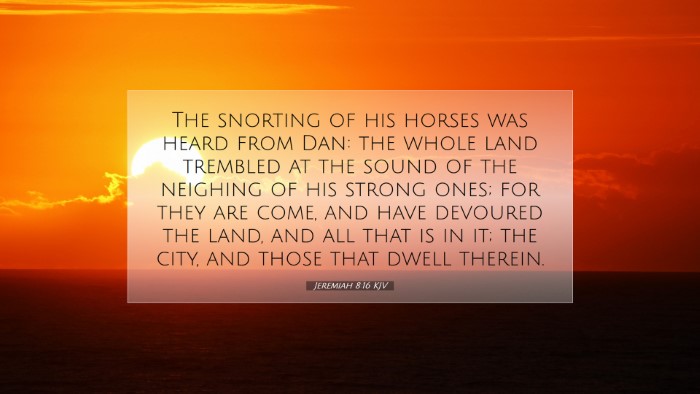Commentary on Jeremiah 8:16
Jeremiah 8:16 (KJV): "The snorting of his horses was heard from Dan: the whole land trembled at the sound of the neighing of his strong ones; for they are come, and have devoured the land, and all that is in it; the city, and those that dwell therein."
Introduction
The prophetic messages in the Book of Jeremiah often reflect the dire circumstances faced by the people of Israel. In Jeremiah 8:16, the sound of horses from the north signifies impending doom and judgment, causing the land to tremble in fear. This verse encapsulates the themes of destruction, fear, and the consequences of disobedience to God.
Commentary Insights
Matthew Henry's Commentary
Matthew Henry emphasizes the alarming sounds of the horses as a metaphor for the imminent invasion by Babylon. The phrase "snorting of his horses" indicates a powerful and aggressive force approaching. Henry notes that the fear spread throughout the land, illustrating the psychological impact of war and terror. He likens the behavior of the horses to that of the invading army, suggesting that the noise represents not just physical invasion but an emotional upheaval among the people.
Henry further points out that Dan, being located in the north, serves as a reference point for the approaching Babylonian army. His mention of “the whole land” highlights the pervasive reach of the impending destruction, affecting every inhabitant. The imagery used conveys a strong sense of fear, urging the people to recognize their current state and turn back to God in repentance.
Albert Barnes' Commentary
Albert Barnes provides a historical context to Jeremiah's message. He interprets the "snorting" as symbolic of the fierce approach of the Babylonian cavalry, which would signify the beginning of warfare. Barnes elaborates that the sound signifies not only the physical advancement of the army but also the psychological state of the nation—filled with fear and trembling as the very foundation of their security—their land and cities—was threatened.
Barnes also connects this verse to the larger narrative of God’s judgment against Israel for their unfaithfulness. The devastation of the land is not merely a political issue but a spiritual one, reflecting God’s displeasure with His people. He emphasizes the necessity for the people to heed the warnings and change their rebellious ways to avert disaster.
Adam Clarke's Commentary
Adam Clarke explores the geographical significance of the mention of Dan and its prophetic implications. He highlights that Dan was the northernmost city of Israel, representing the entry point of the invading forces. Clarke interprets the "trembled at the sound" not only in a literal sense of fear and panic but also as a reflection of spiritual turmoil within the people—unwilling to confront their sinful behaviors that led to this judgment.
Clarke emphasizes that the horses symbolize strength and power. Their "neighing" represents not merely noise but the threat of destruction they bring with them. He indicates that “the land” signifies the entirety of the nation, and that its “devouring” by enemy forces serves as a reminder of the consequences of turning away from God and His commandments.
Thematic Exploration
- Judgment and Consequences: A central theme in this verse highlights God’s judgment upon His people due to their disobedience. The impending invasion of Babylon serves as a direct consequence of Israel's unfaithfulness.
- Fear and Trembling: The emotional response to the approaching army is palpable. This fear represents not only a physical threat but also moral and spiritual blindness to the reality of their choices.
- Call to Repentance: Throughout Jeremiah, there is an underlying plea for the people to return to God. This verse serves as a stark reminder of the urgent need for repentance amidst impending judgment.
Applications for Today
For pastors and theologians, Jeremiah 8:16 serves as a poignant reminder of the responsibilities of leadership within the church and society. The message emphasizes careful attention to the spiritual condition of the people, urging them toward genuine repentance and faithfulness to God’s word.
Students of the Bible can reflect on the parallels between the historical context of Jeremiah and their contemporary situations. The themes of fear, judgment, and repentance remain relevant today as they navigate a world that often turns away from divine principles.
Conclusion
Jeremiah 8:16 illustrates a significant moment in the prophetic message of judgment against Israel. Through the combined insights of Matthew Henry, Albert Barnes, and Adam Clarke, we are reminded of the serious nature of sin, the fear of impending judgment, and the profound need for repentance. As we reflect on this verse, let it prompt us to examine our own lives and the state of our communities in relation to God’s will.


